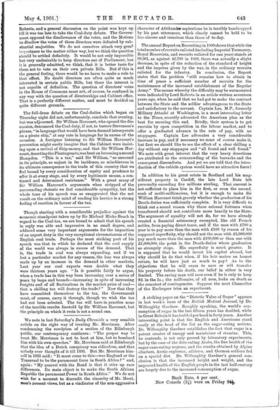The full-dress debate on the Coal-duties which began on Thursday
night did not, unfortunately, conclude that evening, but was adjourned. Sir William Harcourt, who opened the dis- cussion, denounced the Coal-duty, if not, to borrow Stevenson's phrase, "in language that would have been deemed intemperate on a pirate ship," at any rate in language far in excess of the occasion. A foreigner listening to Sir William Harcourt's peroration might easily imagine that the Cabinet were insist- ing upon a revival of Ship-money, and that Sir William Har- court, deserting the Plantagenots,was bent on becoming a second Hampden. "This is a tax," said Sir William, "so unsound in its principle, so unjust in its incidence, so mischievous in its ultimate consequence to the trade of this country that we feel bound by every consideration of equity and prudence to offer it at every stage, and by every legitimate means, a con- tinued and determined resistance." With a great many of Sir William Harcourt's arguments when stripped of the surrounding rhetoric we feel considerable sympathy, but the whole tone of his speech was so exaggerated that the net result on the ordinary mind of reading his heroics is a strong feeling of reaction in favour of the tax.










































 Previous page
Previous page